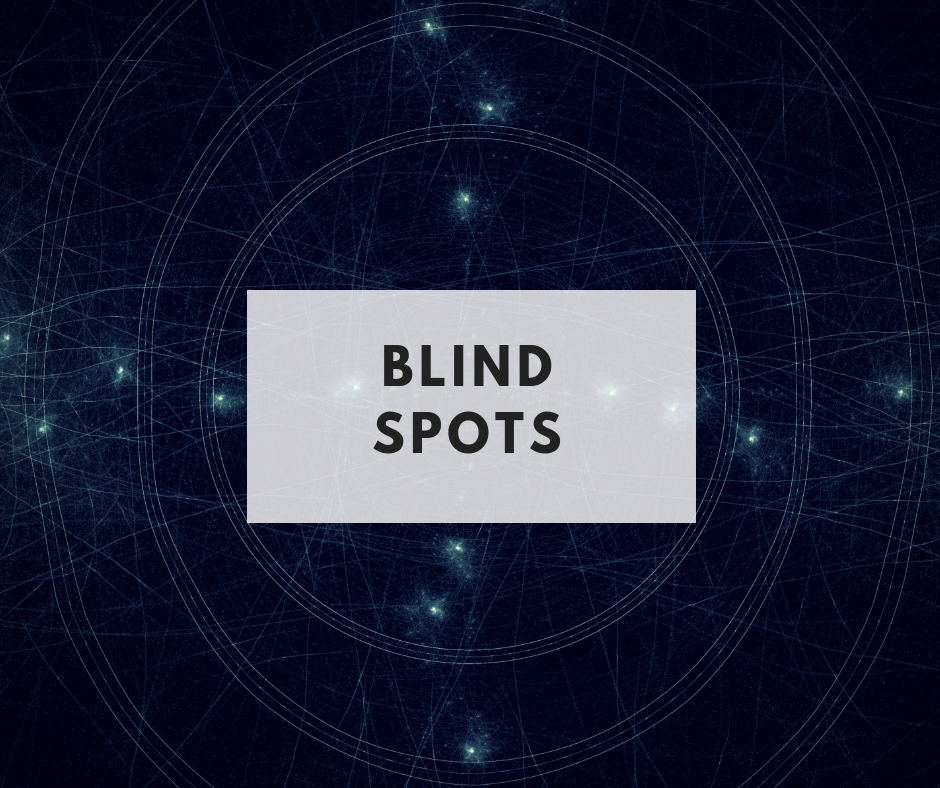We all have blind spots (e.g., being unable to understand something or to see how important something is) when we are learning about something new. For instructional designers, blind spots come with the territory as we’re always learning something new. One of the biggest challenges is how do we start something new when we don’t know what we don’t know?
Throughout in our education, designers learn about analysis as an early phase of the design process. The aim is to help us fill in those blind spots with gathered intel. Setting aside a nagging issue of how much intel is enough to give you a proper perspective, gathering the information is not sufficient. We also must synthesize the new information with what we know, and consider how our knowledge and skills can be used to tackle the design problem.
But, what happens when our synthesis, as well as our perceptions about our knowledge and skills, take us down a bad design path; when WE (and our lived experience) are the cause of the blind spots. We can’t blame it on not knowing what we don’t know. Instead, the fault is making errors in judgment about WHAT is relevant and important. It’s also about allowing our biases and preconceptions (as humans in the process) to creep in and impact our take on the situation.
I get to see a lot of designers make decisions (including reflecting on many of my own each day), and what I describe above has been gnawing at me. What is the impact of ignoring, discounting, and challenging the “givens” in a situation as we synthesize and make decisions? I equate this to sanding off the sharp edges to make something new fit within our worldview.
When done in the extreme, I compare this to changing the rules of the game. In a game, you’re giving a set of facts, conditions, constraints, rules, etc. You would be considered a cheater if you selectively decided to exclude some conditions/constraints or ignore certain rules because they seemed irrelevant (to you) to the point of the game, or got in the way of a more direct way for you to move forward.
Maybe what I’m trying to get at is the risk of bias. But, I think it’s more than that. Also, I don’t think it (usually) comes from a negative place as much as complacency and overconfidence that “we get it”, as well as a mistaken reliance on our past experiences to guide us in this new situation. Even though our worldview and skills (e.g., tools, strategies, values, aims, goals, etc.) can help us in new situations, I feel we need to be honest that our lived histories can CAUSE blind spots in new situations.
For example, I remember one of my early conversations with an adult educator here in Chicago who has worked in adult basic skills education for years. I asked her the same question I get around to asking every time I sit down with adult educators, “What are the ultimate learning goals of the learners you teach?” Fortunately, I knew her well enough that she was willing to laugh directly in my face. My blind spot (aligned with my past experiences as an educator and learner) was front in center. It has been beaten into my head that without learning goals you can’t have successful learning experiences.
After she stopped chuckling, she said, “It doesn’t work that way in adult education.” In looking back through all of her students, she could remember only one student who followed what most of us would consider an “educational path” from adult basic skills education to college. Sure, many students in adult education have goals (e.g., to learn to speak English, to complete a GED), but many of these adults don’t have the luxury of school being their only priority. Life often gets in the way of their educational plans. Bills need to get paid. Family members need care. They land a job, or a slightly better job. They leave school and come back weeks/months/years later, maybe at a different school, or never come back at all.
This is why most adult educators reject the notion of “curriculum”; a biggie of a blind spot for many designers who look at adult education through the same lens as other educational segments … as a progression of students through an extended program of study to an ultimate educational goal. Instead, adult educators work with the student in front of them, and there is no guarantee a student they’re working with this week will be there in a few weeks. Educators have goals for their learners, but the goals are more short-term, more fluid, more practical, more adaptable, and more pragmatic than the types of learning goals we might plan for students in other educational segments.
This example highlights for me the risk (the blind spot) we face (and can cause) when we work on new projects. We can gather a ton of information and bring our previously gained knowledge/skills to the experience, but if we aren’t willing to throw out those same things to consider a new situation, context, learner audience, etc., we risk our blind spot getting in the way of our design decisions.
